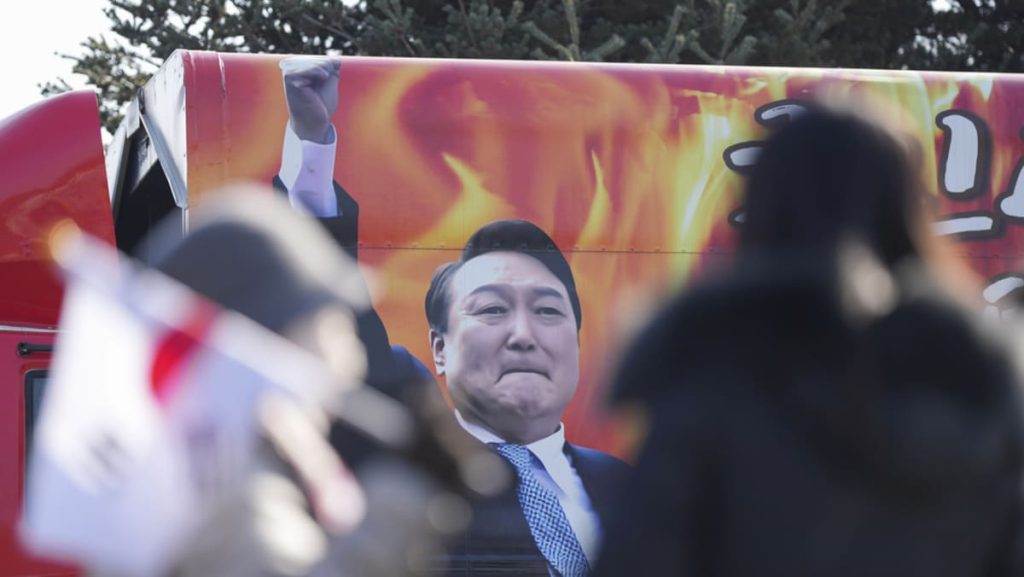The unprecedented arrest and detention of a sitting head of state has sent shockwaves through the political landscape, marking a dramatic turn of events in the ongoing power struggle. Stripped of his executive powers, which have been temporarily transferred to an acting president, the suspended leader now finds himself confined within the walls of a correctional facility, subject to the same regulations and procedures as any other inmate. This stunning fall from grace underscores the fragility of power and the potential consequences of alleged wrongdoing, even at the highest levels of government. The meticulous adherence to standard prison protocol, including the taking of a mug shot and the completion of a physical examination, emphasizes the impartiality of the legal process and the principle of equality before the law. The suspended leader’s reported cooperation with these procedures, devoid of any resistance or special treatment, further highlights the gravity of the situation and the apparent acceptance of the legal process, at least outwardly.
The transition from the trappings of high office to the stark reality of prison life is a stark one, marked by the symbolic exchange of attire. The suspended leader, accustomed to the tailored suits and formal wear of his position, has traded them for the standard-issue khaki prison uniform, a potent visual representation of his changed circumstances. The assignment of an inmate number further underscores this loss of individuality and the imposition of a new identity within the confines of the correctional system. This process of assimilation into the prison population, however unique given the individual’s status, aims to maintain uniformity and order within the facility, treating all inmates equally regardless of their background or former position. The mundane details of prison life – a small table for eating and studying, a shelf for personal belongings, a sink and a toilet – highlight the stark contrast between the leader’s previous existence and his current reality.
The limited amenities available to the suspended leader, including a television with restricted viewing time, reflect the controlled environment of the prison setting. While these provisions offer a modicum of comfort and distraction, they are carefully regulated to maintain order and security within the facility. The daily routine, which includes an hour of exercise and a weekly shower, further emphasizes the structured nature of prison life, designed to instill discipline and routine among inmates. However, the unique circumstances of this particular inmate, a sitting head of state albeit suspended from his duties, necessitate additional security measures to ensure his safety and prevent any potential disruption within the prison population. Reports indicate that authorities are taking precautions to minimize his interaction with other inmates, a deviation from standard practice necessitated by his high-profile status and the potential for conflict or unrest.
The presence of the suspended leader’s personal security detail, accompanying him whenever he leaves his cell, underscores the extraordinary nature of this situation. While prison officials are responsible for the overall security of the facility and its inmates, the presence of a dedicated security detail specifically for the suspended leader highlights the unique security concerns surrounding his detention. This arrangement aims to mitigate potential threats while ensuring the smooth operation of the prison and the safety of all inmates. It also reflects the delicate balance between upholding the principles of equal treatment within the prison system and acknowledging the exceptional security needs of a high-profile individual facing serious allegations.
The suspension of the leader’s powers and his subsequent detention have created a power vacuum, filled temporarily by the acting president. This transition of power, while seemingly smooth, underscores the underlying political tensions and the potential for instability in the aftermath of such a dramatic event. The acting president now assumes the responsibility of leading the nation while the legal proceedings against the suspended leader unfold. This dual leadership structure, with a suspended head of state and an acting president exercising executive powers, presents a unique set of challenges for governance and could potentially lead to further political maneuvering and uncertainty. The focus now shifts to the legal process and the eventual outcome of the charges against the suspended leader, which will ultimately determine the future course of the nation’s political landscape.
The arrest and detention of a sitting head of state, while unprecedented in this context, serve as a stark reminder of the principles of accountability and the rule of law. Regardless of one’s position or status, no individual is above the law, and alleged violations must be addressed through the established legal processes. The unfolding events will undoubtedly have a profound impact on the country’s political landscape and will serve as a crucial test of its democratic institutions and their capacity to navigate complex legal and political challenges. The world watches closely as the drama unfolds, observing the adherence to due process and the ultimate resolution of this extraordinary situation. The implications extend beyond the borders of this nation, serving as a potent example of the importance of upholding the rule of law and holding leaders accountable for their actions.

